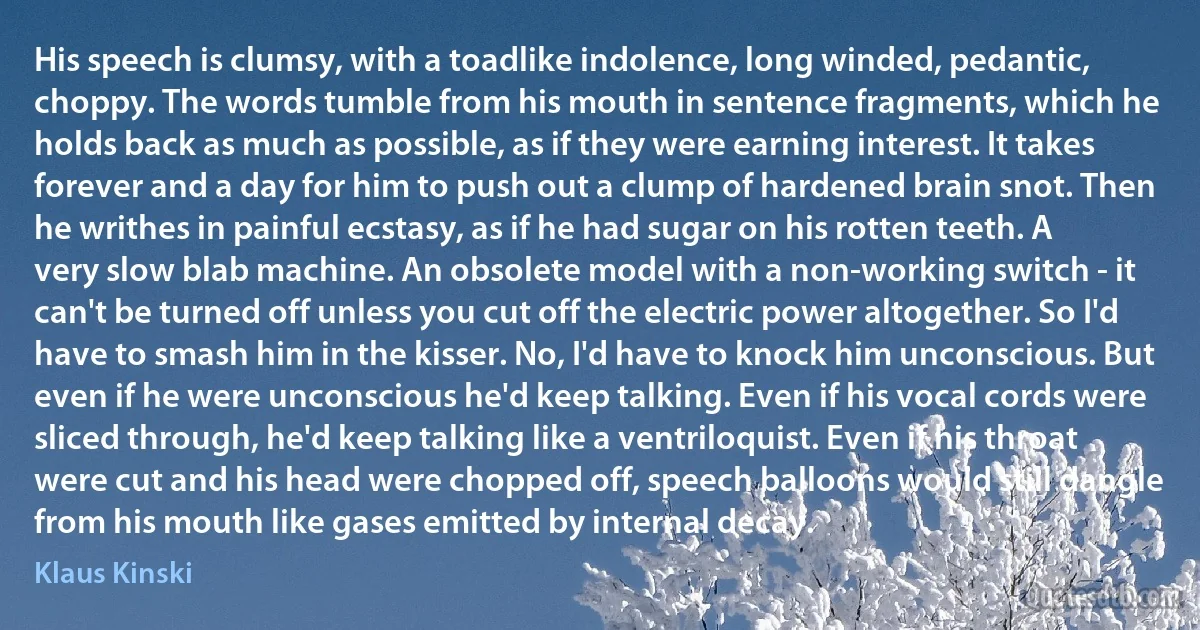
His speech is clumsy, with a toadlike indolence, long winded, pedantic, choppy. The words tumble from his mouth in sentence fragments, which he holds back as much as possible, as if they were earning interest. It takes forever and a day for him to push out a clump of hardened brain snot. Then he writhes in painful ecstasy, as if he had sugar on his rotten teeth. A very slow blab machine. An obsolete model with a non-working switch - it can't be turned off unless you cut off the electric power altogether. So I'd have to smash him in the kisser. No, I'd have to knock him unconscious. But even if he were unconscious he'd keep talking. Even if his vocal cords were sliced through, he'd keep talking like a ventriloquist. Even if his throat were cut and his head were chopped off, speech balloons would still dangle from his mouth like gases emitted by internal decay.
Klaus KinskiRelated topics
brain chop cut dangle day ecstasy electric forever head interest kisser knock model mouth off possible power push slow snot speech sugar talking teeth throat unconscious ventriloquist vocal wordsRelated quotes
Right now, at this very moment, on American highways, there are no less than 5,000 concentration camp trucks. Trucks that we have constructed. Inside these trucks, there are living, terrified innocent beings. Cows and pigs and chickens. These trucks are being driven to concentration camp's slaughterhouses that we carefully constructed all across America. When the trucks arrive, the animals are so frightened that they won't even get off the truck. They're not stupid, they know what's next. So people go on the trucks with electric prods and force them to walk down the chutes to their own deaths. Or if the animals are small enough to man handle, like chickens, we'll just grab them off the trucks and toss them inside.Inside, these innocent, living beings are hanged upside down, fully conscious. In other words,they go in alive, against their will, and come out chopped up, into hundreds of pieces.

Gary Yourofsky
It is an act of cruelty, of barbarism, to kill, to strike unconscious, and to cut the throat of animals, who do no harm to anyone, the way we do; because they are sensitive to injury and pain just as we are, regardless of what is said vainly, falsely, and ridiculously by our new Cartesians, who regard them as purely machines without soul and without feelings ... This is a ridiculous opinion, a pernicious principle, and a detestable doctrine, because it clearly tends to stifle in the hearts of men all feelings of kindness, of gentleness, and of humanity that they might have toward these poor animals. ... Blessed are the nations that treat them kindly and favorably, who are compassionate toward their miseries and their pains; but cursed are the nations that treat them cruelly, who tyrannize over them, who enjoy shedding their blood, and who are avid to eat their flesh.

Jean Meslier
Did you have one of those days today, like a nail in the foot? Did the pterodactyl corpse dropped by the ghost of your mother from the spectral Hindenburg forever circling the Earth come smashing through the lid of your glass coffin? Did the New York strip steak you attacked at dinner suddenly show a mouth filled with needle-sharp teeth, and did it snap off the end of your fork, the last solid-gold fork from the set Anastasia pressed into your hands as they took her away to be shot? Is the slab under your apartment building moaning that it cannot stand the weight on its back a moment longer, and is the building stretching and creaking? Did a good friend betray you today, or did that good friend merely keep silent and fail to come to your aid? Are you holding the razor at your throat this very instant? Take heart, comfort is at hand. This is the hour that stretches. Djam karet.

Harlan Ellison
Every artificial excavation-every well and cellar-every cut for a fort, common road, railway, or canal-every quarry-every tunnel through a mountain-and every pit and gallery of a mine bored into the solid earth, furnish means of investigating its interior. Still more do the inland precipices, and the rocky promontories and headlands along the rivers, lakes, seas, and oceans; the naked mountain-sides ribbed with strata, that bound the defiles, gorges, and valleys; the ruins accumulated at the feet of lofty pinnacles and barriers, and those that have been transported and scattered, far and wide, over the earth; present us with striking features of the internal structure of our planet. Most of all, do the inclined strata push up their hard edges, in varied succession, and thus faithfully disclose the form and substance of the deep interior, as it exists many miles and leagues beneath the observer's feet.

Gideon Mantell
There is no single speech nor article in which it is not said that the purpose of all these orgies is the peace of Europe. At a dinner given by the representatives of French literature, all breathe of peace. M. Zola, who, a short time previously, had written that war was inevitable, and even serviceable; M. de Vogue, who more than once has stated the same in print, say, neither of them, a word as to war, but speak only of peace. The sessions of Parliament open with speeches upon the past festivities; the speakers mention that such festivities are an assurance of peace to Europe.
It is as if a man should come into a peaceful company, and commence energetically to assure everyone present that he has not the least intention to knock out anyone's teeth, blacken their eyes, or break their arms, but has only the most peaceful ideas for passing the evening.

Leo Tolstoy
